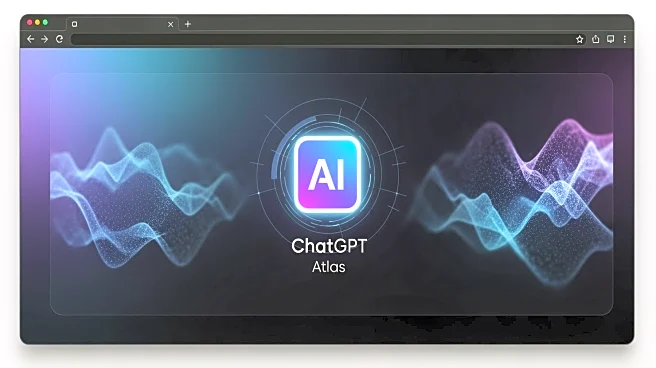What's Happening?
OpenAI is preparing to unveil its new AI web browser, ChatGPT Atlas, during a livestream event. The browser integrates OpenAI's Operator AI agent, enabling users to perform tasks such as booking reservations and filling out forms directly through the
browser. Atlas is designed to offer a seamless interaction with the ChatGPT interface, allowing users to engage with the chatbot without visiting a separate website. The browser is expected to run on Chromium, similar to other major browsers like Chrome and Edge. This launch marks OpenAI's entry into the competitive AI browser market, which includes products from Google, Perplexity, and Microsoft.
Why It's Important?
The introduction of ChatGPT Atlas signifies OpenAI's strategic expansion into the browser market, leveraging its AI capabilities to offer enhanced user experiences. By embedding AI functionalities directly into the browser, OpenAI aims to streamline internet usage and provide personalized interactions. This move could challenge existing browser giants, prompting them to innovate further in AI integration. The competition among AI browsers is intensifying, with major tech companies vying for dominance in this emerging field. The success of Atlas could influence the future direction of web browsing and AI application in everyday technology.
What's Next?
As OpenAI launches ChatGPT Atlas, the browser will initially be available on macOS, with plans to expand to other platforms. The competitive landscape will likely see increased innovation as companies strive to offer unique AI-driven features. Users can expect more personalized and efficient browsing experiences, potentially transforming how they interact with the internet. The broader implications of AI integration in browsers will be closely watched by industry stakeholders, including tech companies and regulatory bodies, as they assess the impact on user privacy and market dynamics.
Beyond the Headlines
The rise of AI-powered browsers like Atlas raises important questions about data privacy and the ethical use of AI technology. As these systems become more prevalent, ensuring user control and transparency in data handling will be crucial. The potential for AI to reshape digital communication and information access presents both opportunities and challenges, requiring careful consideration by developers and policymakers.

















